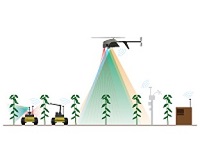Breeding High Yielding Bioenergy Sorghum

Technology Description:
Clemson University is partnering with Carnegie Mellon University (CMU), the Donald Danforth Plant Science Center, and Near Earth Autonomy to develop and operate an advanced plant phenotyping system, incorporating modeling and rapid prediction of plant performance to drive improved yield and compositional gains for energy sorghum. The team will plant and phenotype one of the largest sets of plant types in the TERRA program. Researchers will design and build two phenotyping platforms – an aerial sensor platform and a ground-based platform. The aerial platform, developed by Near Earth Autonomy, is a fast moving, autonomous helicopter outfitted with sensors that will collect image data from above. The ground platforms are customized robots from CMU that will drive between crop rows below the plant canopy and collect data using two distinct sensor suites. The first will use sophisticated cameras and imaging algorithms to develop detailed 3D models of individual plants and their canopy structure. The second will have the unique ability to directly contact the plant in order to systematically measure physical characteristics that were previously measured manually with labor-intensive, low-throughput methods. The team will use machine learning techniques to analyze the data gathered from the phenotyping systems and translate this into predictive algorithms for accelerated breeding of improved biofuel plants.
Potential Impact:
If successful, Clemson’s initiative will deliver commercially viable automated crop sensing platforms, advanced methods and datasets for rapidly breeding improved plant hybrids, and improved, high-yielding hybrids of biofuel crops.
Security:
Improved biofuel crops could lead to increased production of domestic biofuels, reducing dependence on foreign sources of transportation fuels.
Environment:
Increased use of biofuels could significantly reduce CO2 emissions from transportation, and improved varieties of biofuel crops could use less water and be more resistant to environmental stresses.
Economy:
Advanced crop breeding techniques could improve and lower the cost of developing high yielding and high quality crop hybrids for biofuels and other agricultural applications.
Contact
ARPA-E Program Director:
Dr. David Babson
Project Contact:
Dr. Stephen Kresovich
Press and General Inquiries Email:
ARPA-E-Comms@hq.doe.gov
Project Contact Email:
skresov@clemson.edu
Partners
Donald Danforth Plant Science Center
Carnegie Mellon University
Related Projects
Release Date:
10/01/2014
